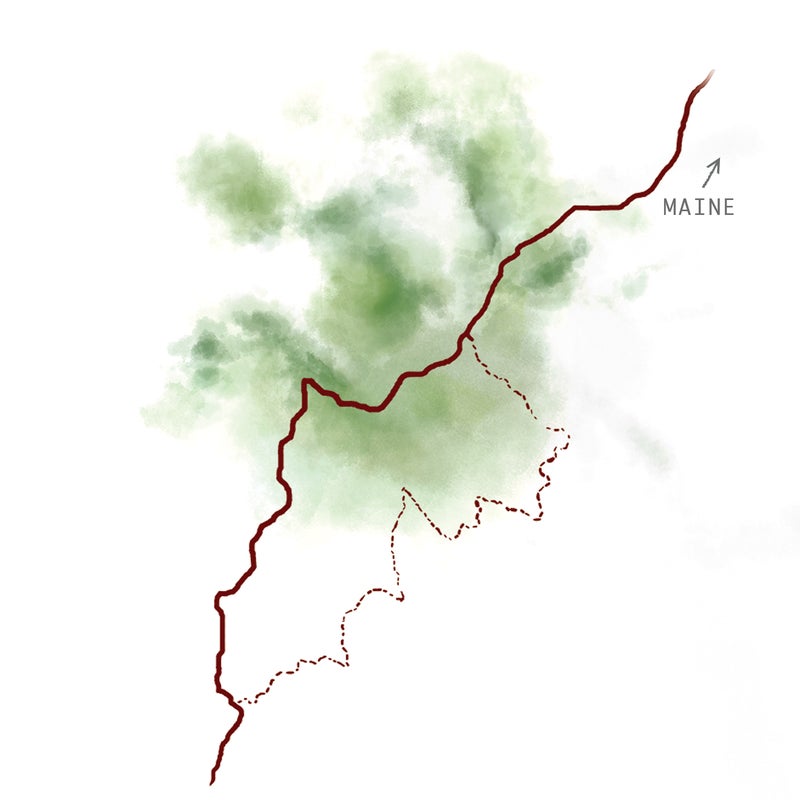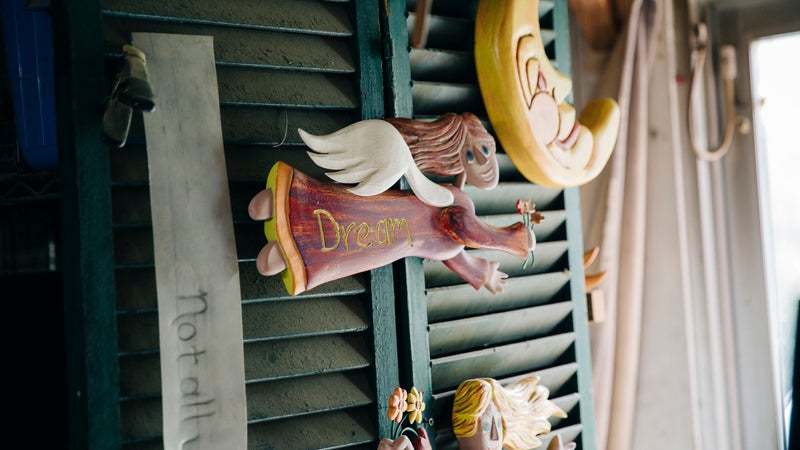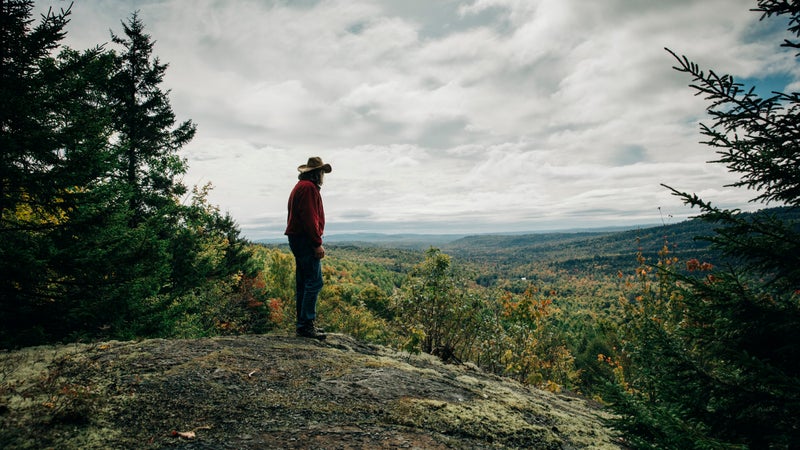Trail Angel
Helping out Appalachian Trail through-hikers has allowed "Ponytail Paul" Stiffler to finally find peace in his own life
The rain just kept coming last October. A slow-moving storm drenched northern Maine so thoroughly—more than four inches in one day alone—that it flooded roads and made fording rivers impossible, washing out dozens of the natural log bridges that span local creeks. It was the kind of rain that renders umbrellas useless and eventually saturates even the fanciest hard shells.

The final groups of northbound Appalachian Trail through-hikers were hunkered down under lean-to shelters and soggy tents; the lucky ones had made it to the nearest town to wait out the storm. One of the only people out on the trail was Paul Stiffler, or “Ponytail Paul,” as he’s known for his recognizable ponytail. Water dripped from the brim of his felt hat, and his jeans were soaked through. But it barely seemed to faze Paul. He had magic to make.
Not far from Dover-Foxcroft, Maine, where Paul lives, the AT enters what’s known as the Hundred-Mile Wilderness, widely regarded as the most remote and rugged stretch of the trail. Hikers must be totally self-sufficient and carry enough food and water on their back for up to ten days alone on the trail. The nearby town of Monson is the last civilization northbound hikers will pass through as they close in on Mount Katahdin. For southbound hikers, it’s their first chance to call it quits.

As a result, the area is rife with so-called trail angels, locals who have taken it upon themselves to buoy the spirits of hikers by performing what’s known as trail magic—random acts of kindness, often in the form of fresh fruit, cold drinks, or a ride into town.
Paul is one of the area's more tireless angels. The day before, he met two hikers, Janezilla and Mushu, and their dog, Luna, in Monson and offered to set up a resupply roughly midway through the Hundred-Mile Wilderness so they wouldn’t have to carry a full ten days of food in their packs. Earlier in the morning, he filled three five-gallon plastic buckets, sealed them with duct tape, labeled them, and then carefully hung them from a few trees at the prearranged resupply point, about a half-mile hike in from an old logging road.
Resupplying hikers like Janezilla and Mushu is just one of the many kind things Paul does for passing through-hikers. Other days, he’ll head to the trail with a cooler and gas grill and cook up an impromptu picnic, and he often gives hikers rides or invites them to stay in his yard for the evening. “In the past few years, people have gotten ahold of my phone number,” Paul says. “Southbounders will meet me and give my name and number to northbounders.” One hiker Paul helped out a few years ago is now his roommate. Together, they hit the trail and offer up support.
Although the moments Paul spends with hikers can often be fleeting, the bonds are long-lasting and the effects on him have been profound. About ten years ago, Paul’s life appeared to be perfect. He had a successful woodworking shop with 20 employees and a never-ending stream of orders for toys and furniture. Everything was great, until suddenly it wasn’t.
“I had my first flashback in church, and all of the sudden I just started shaking and things kind of grayed out,” he says. Debilitated by PTSD resulting from an abusive childhood, Paul’s life started to unravel. He became a recluse. His business went under and he filed for bankruptcy. “I’d sit in my shop and just shake and cry,” he says. “And then I’d leave the shop and go home and try to look normal. That was the hardest part, just trying to look normal when your whole world is on fire.”

He couldn’t talk to people, didn’t know why or how he had lost control of his life. No matter how hard he tried to fix it, nothing worked. So he started going out into the woods. “I’d go out and get some fresh air and some beautiful scenery,” he says. “It was my medicine.”
“It’s man against nature for 2,189 miles,” says Paul. “You commit yourself to sometimes up to six months having to rely solely on your own feet getting you from one point to another. Five million steps. It’s a legendary journey.”
The first people Paul helped were two elderly women. He saw them coming off the trail and offered to give them a ride into town. When he grabbed their packs to throw into his truck bed, he couldn’t believe the weight they were carrying. The women told Paul they were through-hikers nearing the final leg of their trip from Springer Mountain in Georgia to Mount Katahdin in Maine’s Baxter State Park. “I was fascinated by that,” he says. Surprisingly, given that he had been living for decades just a few miles from the AT, it was the first time Paul had heard of the Appalachian Trail.

A few days after Paul resupplied Janezilla and Mushu, the sun finally began to dry out the trail as hikers hustled north the first snow fell on Katahdin. Paul walked through the woods toward Big Wilson Falls, his “favorite spot on earth,” a cooler in one hand and a gas grill in the other.
After getting the first round of hot dogs on the grill, he assembled a spread of potato salad, cookies, and soda. Pretty soon, hikers who’d trekked the eight miles in from Monson that morning came around the corner, surprised and elated to see Paul. “Trail magic in the 100-Mile?” said one hiker. “I wasn’t expecting that.”
It's an eclectic crew picnicking on the rock today and before long there are a half-dozen hikers eating and laughing. “I've meet people from all walks of life with all different reasons for being on the trail,” says Paul. “Military guys out there walking off the war, people going through divorce, and people who just needed time to themselves.”
Paul understands what they’re going through, how being in the wilderness, slowing down, and resolving yourself to completing such a major undertaking can hit the reset button and help restore balance in your life. “It’s man against nature for 2,189 miles,” he says. “You commit yourself to sometimes up to six months having to rely solely on your own feet getting you from one point to another. Five million steps. It’s a legendary journey.”

Helping others complete that journey has helped Paul reconnect with society and with himself. He’s working in his shop again, selling handmade figurines and furniture, most with messages of hope painted across them, like an angel holding a banner that reads “peace.” He’s finally managed to find some of that for himself, too.
Standing on a bluff, staring out at the trees toward Mount Katahdin, Paul’s blue eyes lit up and a smile crept across his face. Paul has hiked all around the 100-Mile and surrounding woods, but he’s never hiked the peak. Not yet, at least. He’s saving it for when he through-hikes the Appalachian Trail for the first time with his oldest son, when he graduates college next year. “The trail draws out a power in people,” says Paul. “I’ve seen it change a lot of people’s lives in very positive ways. It’s already changed mine. Helping Appalachian Trail hikers when they're going through difficult situations, I'm helping them but they're helping me at the same time. I'm starting to find peace, peace of mind.”
Every Trail Connects: REI believes that a life outdoors is a life well lived, and Paul’s story is the second of a three-part series dedicated to people deeply connected with trails. To learn more about the Appalachian Trail, including the people working to protect and preserve it, please visit .
